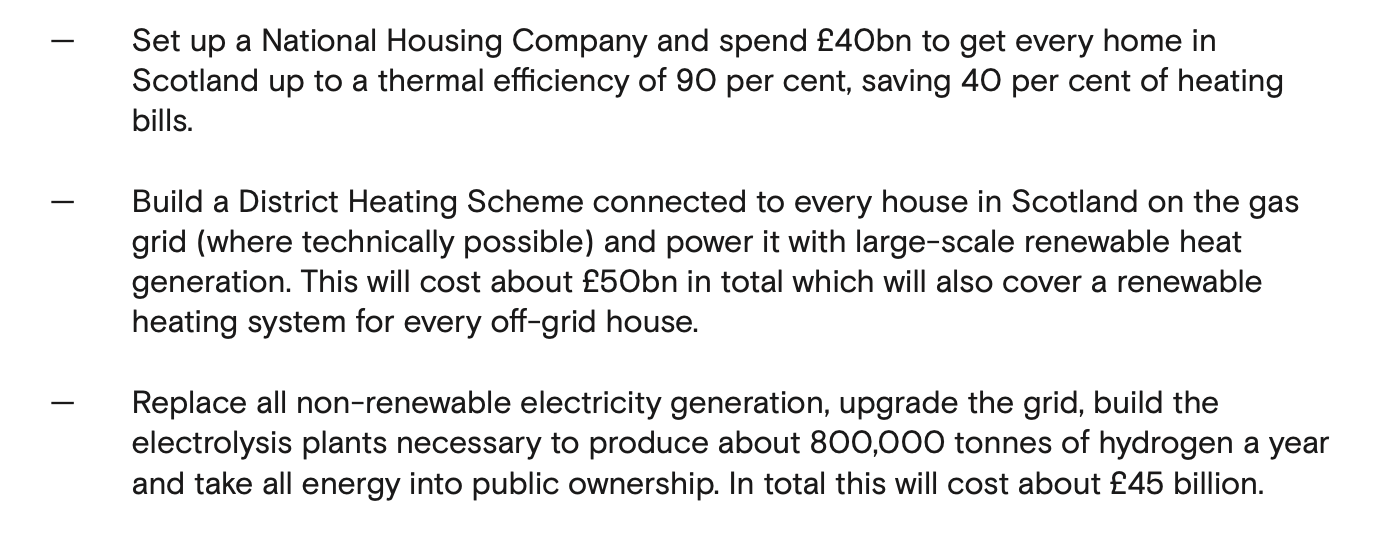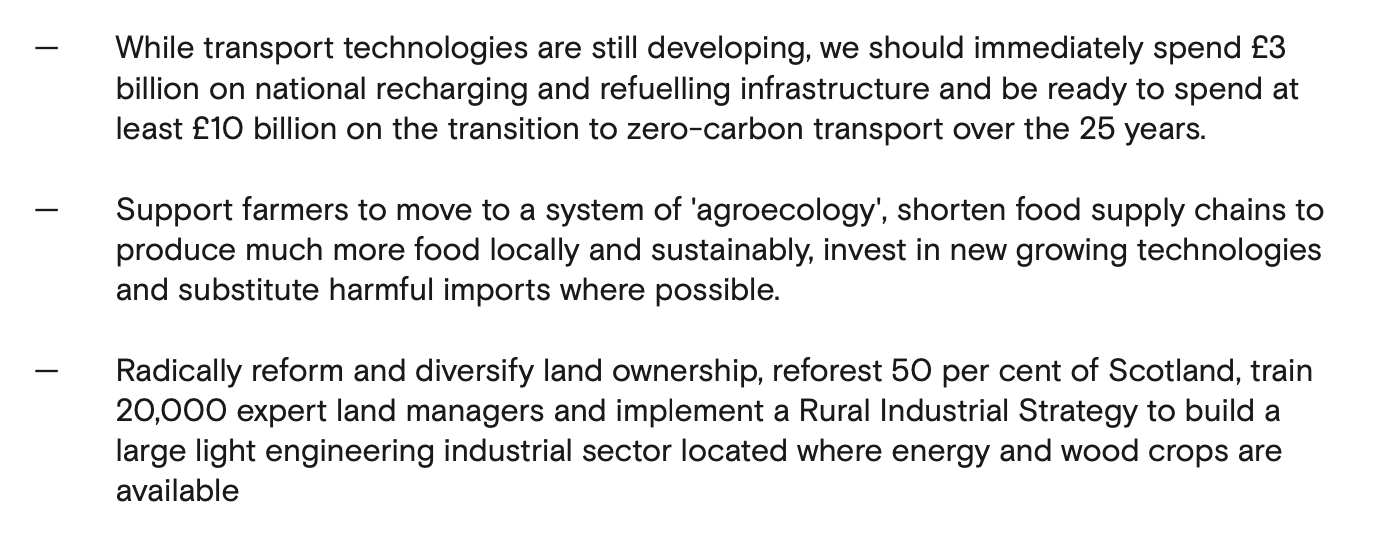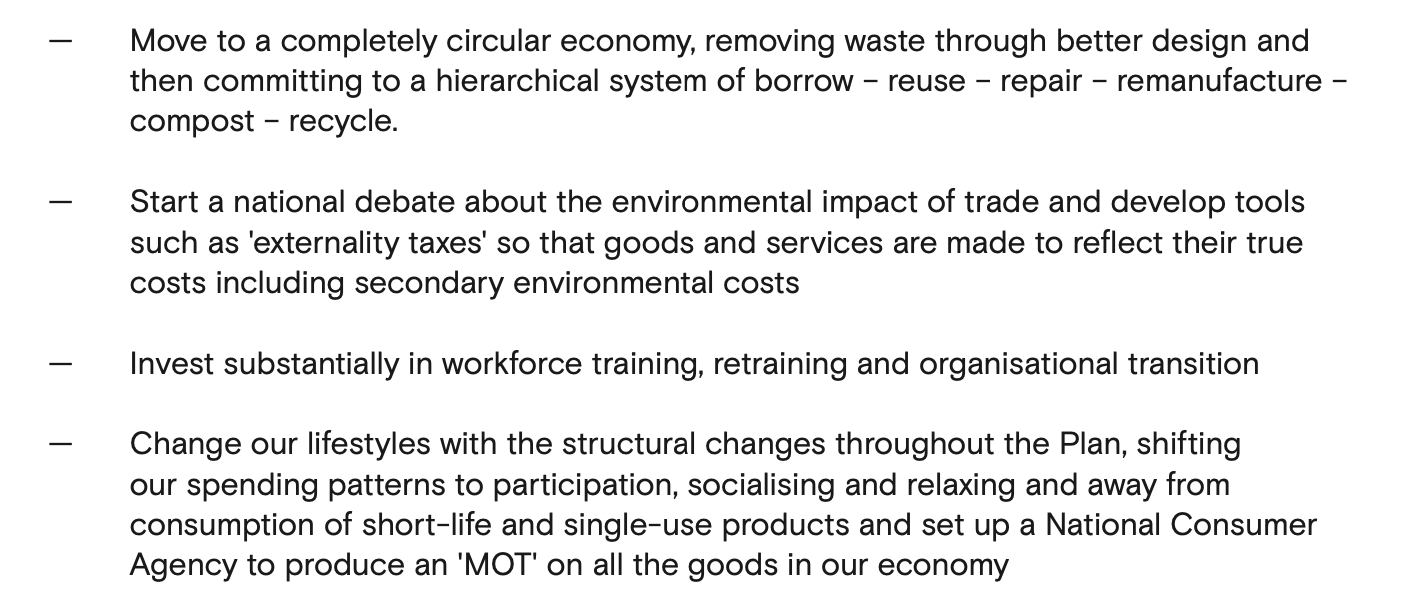Green New Deals, everywhere, all over... From Scotland's Our Common Home, to Rifkin's massive opportunity
What kind of election is this UK General Election? Is it a “Brexit Election”, an “End Austerity Election”… or a “Climate Election”? All manner of subtle overlaps and hidden connections between these, of course - but for the sake of A/UK’s focus, let’s assume that it should be primarily a Climate Election.
We’re waiting on the Labour policy manifesto launch next week, which is widely trailed as being about a “Green Industrial Revolution” - their preferred version of what the Green Party of England and Wales have more straightforwardly called a “Green New Deal” (and with every right to claim the title - their leader Caroline Lucas has been involved in plans for it since the beginning - see our GND coverage here).
It’s fascinating to watch “Green” - its imperatives sharpened by Extinction Rebellion, the Youth Climate Strikes and the IPPC Environmental report - now becoming the qualifier of choice, for what would seem 20th century (or even 19th century) frameworks like “New Deal” or “Industrial Revolution”.
Is there danger in this for their advocates? Might it seem like the same prescriptiveness from elites, whether they be governmental, activist or labour movement, coming down from on high, that was at the seat of the Brexit vote?
And: If hundreds of thousands (or even millions) of new, well-paying, trade-and-skill-oriented jobs are created by vast new infrastructure spending plans, will the climate effect be subverted, if our consumerist behaviours and cultures are not also addressed?
Here are two different perspectives on how these massive green development plans might land on a weary, suspicious, ground-down populace.
How responding fully to climate crisis can bring utopia closer: Common Weal’s Our Common Home
The Scottish think-and-do-tank Common Weal (disclosure: Pat Kane, A/UK’s co-initiator, is on the board of CWeal) launched its GND plan for Scotland, titled Our Common Home (website), today (their mood video is embedded at the top of this post).
Their claim is that this is “the world’s first fully-costed and itemised Green New Deal plan” (well, maybe by a few weeks).
And if you look at their list of highlights (in the panel below), you can see a familiar pattern - of considerable long-term national investment (£100 billion, repaid over 50 years) enabling a plethora of specific infrastructural developments that are “one-build”.



Meaning, if they’re properly constructed with a view to the long term (local energy grids, passivehaus homes, and electric car points regarded like sewers and roads), they should last well beyond the middle of this century, and more than pay their cost back in taxes and energy savings.
But the deep theme in Common Weal is their conscious attempt to try and remove the burden of change from the shoulders of the individual, and their own planet-damaging behaviours. “Structural”, collective reform, achieved through sustained public works, is the chosen route.
So when we come to the “Us” section of OCH - looking at the lifestyle consequences and subjective experience of this plan - it’s deliberately placed as the last chapter. Yet it’s fascinating to see how the preceding reconstruction of society is expected to shape our characters - or what character it requires to function properly. It begins with a theory of human nature:
Our behaviours are driven by fundamental human needs and desires – the need to be fed and clothed and sheltered, the need toform community and find our place in it, the desire to share and be kind, to be respected, to feel successful and attractive. These are fundamental to humankind and will not change.
What will change is how we meet these needs and desires. We can meet our need for nourishment without highly-processed and addictive foods, our need for clothing (and our sense of style) without throwaway ‘fast fashion’, our need for shelter without house price inflation.
We can meet our needs for community and respect without that respect being based on how many products we own, kindness can be expressed by what we do for others, not what we buy for others. Attractiveness does not need to result from conspicuous consumption and our sense of success need not be based on the short-lived ‘rush’ of shopping.
It used to be different; social status (how people perceive themselves and others in their communities) did not always revolve around consumption and ownership. We used to value and respect people for their skills and contributions – the status of a farmer did not come from owning a tractor, the status of a doctor was not related to her car, the person we knew we could turn to for advice was not respected because of a big television.
This shift was not accidental; at the beginning of the 20th century, when technology meant that humankind could manufacture much, much more that was needed to live comfortable lives, industries asked how they could get people to buy these new products.
The solution was to make people feel self-conscious if they didn’t own them, to make them believe that they should feel shame for not possessing items even though they had no real need for them, and to persuade people that it really was consumption that conferred social status.
This is what led to advertising and marketing as we know them and over the last 100 years uncountable amounts have been spent trying to persuade us that we’ll be more sexually attractive if we buy the car, more loved by our children if we buy them the elaborate toys, more respected by our neighbours if we replace our sofa regularly.
We need to take steps to rebuild our sense of ourselves and to change how we confer social status. This doesn’t mean we have to live without modern comforts or new technologies, but it means that we should stop telling ourselves they’re anything more than a sofa, a TV, a car. We can rebuild community and place more value on contribution – what people do, not what they own.
We must be given the confidence to reject much more. We need to be able to enjoy a child’s birthday party without thinking the other parents are judging the value of the presents, or simply to say ‘you know what, I don’t need a new sofa’. The best way to do this is structural…helping us to rebalance the prices of things and the way we use them.
‘Share shops’ where you can pop in and borrow a drill or a sewing machine for the day make us all equal in what we can do, and when reusable and repairable technology becomes the norm we don’t need to be ashamed of an ‘old’ phone. [Note this week’s blog on sharing - Ed].
Again, it is important to be clear that this is not about sacrifice or reducing our quality of life – we’ll still spend our money on things that make us happy, but what those things are will change.
We will shift how we spend towards participation (like sports or drama or music or gardening), socialising (being together with people in ways that do not become a ‘spending competition’) and relaxing (rather than fighting our way round busy, stressful shopping malls we will spend our income on activities that ‘regenerate’ us).
When a sign of success is not coming home on a Saturday laden down with shopping bags but with the rosy glow of calm, relaxed happiness, the tyranny of ‘stuff’ will decline.
More in the full Our Common Home report here.
Capital tied to carbon is about to go bust - and Jeremy Rifkin urges administrations of all sizes to entice them to build green infrastructure
We noticed something in a Financial Times article on GND recently - the notion that “at least $4tn of capital invested in carbon-intensive energy businesses will be turned into ‘stranded assets’.” What does this mean, shorn of the business jargon?
One of our favourite sustainability authors, Jeremy Rifkin, has just written a new book on The Green New Deal, which provides a resounding explanation. See this interview with the German website DW:
In "The Green New Deal" I point out that we're on the cusp of a collapse of the fossil fuel civilization. This is hard for people to imagine—we've lived 200 years off fossil fuels across all of civilization. Our construction materials, our fertilizers, pesticides, pharmaceutical products, food additives, power, transport, heat, light, packaging — it's everything.
But what's happened here, and this is really enormous, is that this year the cost of solar and wind, the levellized cost of scaled solar and wind has now plummeted below the cost of nuclear, below the cost of oil, below the cost of coal and now below the cost of natural gas.
So what's happening is we're sitting on the biggest bubble in history — stranded assets in the fossil fuel industry — because now the cost of solar and wind are cheaper, it means all of the gas-fired power plants and the pipelines and the refineries and all the way to the gas stations are stranded assets. They will not “amortize” out [meaning that they won’t be gradually paid off - Ed.]
…Citigroup, a big bank, says this could be some $100 trillion in stranded assets across the fossil fuel civilization. The Economist magazine's Intelligence Unit said it's at least $40 trillion.
Our projections are that over the next 10 years this Third Industrial Revolution infrastructure, made up of solar and wind electricity and electric transportation vehicles, is going to mean that the fossil fuel civilization will probably collapse somewhere around 2028.
It's a huge vacuum and what it makes possible now is a new Third Industrial Revolution infrastructure, because the market is now speaking. The market is so powerful it makes no difference what a fossil fuel industry tries to do to lobby to stay in existence. The market is saying it's over. The problem is the invisible hand is there with the market, but now local governments, regional governments and national governments have to lay out this Third Industrial Revolution infrastructure.
…What I’ve made clear in "The Green New Deal" is that the market is a powerful force and is saying we're seeing the collapse of fossil fuels because solar and wind are now cheaper and batteries are cheaper and these are coming in and they're going to be cheaper electric vehicles. But that's not enough. You have to have a new infrastructure in place to manage power and move day-to-day life.
That means the digital communication internet has to join with an energy internet and a mobility internet. And we have to transform all the buildings to internet-of-things-smart platforms. Businesses don't do infrastructure. It's up to local governments and it's up to regional governments and national governments. They have to lay out the infrastructure to make possible the new business opportunities and the new jobs.
Eleven trillion dollars have now been taken out of the fossil fuel industry, especially by pension funds. And these pension funds say “my God, if this is collapsing we don't want millions of workers not to get their retirement funds”. The problem is they have all the money and they want to now invest in a Third Industrial Revolution Green New Deal.
But it's up to localities and cities and states to come up with infrastructures that can be scaled, as the money is there. But the pension funds don't want to invest in little pilot projects - like a hydrogen bus or a little bike path.
They want to invest in a whole transformation of a city or region. So all the money is there through public pension funds and other investments, they've all gotten out of fossil fuels. But now the cities have to step up.
The regions have to step up. Countries have to step up. Governments have to help lay out this infrastructure — involve their communities in this transformation. And that's where the millions of new jobs will come from.
As supporters of “little pilot projects…like a hydrogen bus or a little bike path”, we are more than interested in Rifkin’s emphasis here. Is it really the case that fund holders and financiers are waiting for national and regional administrations to propose their green infrastructure plans, and pile in with their share of the investment?
Rifkin’s point about “involving their communities in this transformation” seems like an afterthought at the end of this interview—but we feel it’s actually the most crucial part. If general civic legitimacy is withdrawn from massive new green planning, recoiling from yet another imposition of “elite planning from above”, then the glittering progress of the eco-modernisers gets halted from below.


